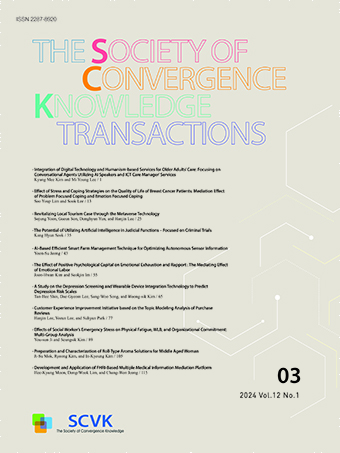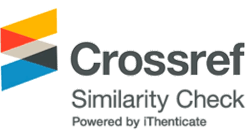Research Article
Abstract
References
Information
본 연구는 문제중심학습(PBL)의 교수법을 적용하여 아동문학교육 교과목을 운영 한 수업 사례에 관한 것이다. 설정된 PBL 과제는 ‘놀이 중심 그림책 읽기 활동 자료집 개발’이었으며, 수업이 PBL 문제를 해결하기 위한 자기주도적 학습의 과정이 될 수 있도록 ‘문제제시 및 확인’, ‘비계설정’, ‘자료수집’, ‘문제재확인 및 해결계획안 발표’, ‘문제해결안 발표 및 평가’의 과정으로 구성되었다. 참여 학생들은 경기도 S 대학교 유아교육학과에서 2019년 2학기에 개설한 아동문학교육을 수강한 1학년 학생 18명이었다. 학생들은 매일의 학습경험에 대한 성찰일지를 작성하면서 그림책 읽어주기 시연, 문제 해결을 위한 협력 학습 및 결과 발표, 동료 평가 및 자기 평가, 최종보고서 제출 등의 임무를 수행했다. 학생들은 PBL을 적용한 아동문학교육 수업에 대한 경험으로써 ‘불확실성의 어려움’이 있었지만 ‘빈 바탕에서 시작하는 수업의 장점’을 말했다. 또한 ‘어려웠지만 전공과 친해지게 만든 수업’, ‘함께 만드는 즐거운 경험’, ‘많은 과제에 대한 부담, 그러나 어느 하나도 뺄 수 없는 것’으로 자신의 경험에 긍정적인 의미를 부여하였다. 이에 논의에서는 본 연구의 사례와 같은 PBL 수업을 통해 학생들이 유아 교사로서 창의적 역량과 수업전문성 역량을 함양 할 수 있음을 제언하였다.
This study is about a case of class in which the Children’s Literature Education was operated by applying problem-based learning. The PBL problem set in this class was ‘Development of a play-centered picture book reading activity resource book.’ And it consisted of the processes of ‘problem confirmation’, ‘scaffold setting’, ‘data collection’, ‘re-checking & planning to solve the problem’, ‘presentation and assessment of final problem solution’ so that the class can be a self-directed learning process to solve the PBL problem. Participants were 18 first grade students in the dept. of early childhood education at S University located in Gyeonggi-do, taking the Child Literature Education course established in the second semester of 2019. They performed tasks such as demonstrating reading picture books, collaborative learning to solve problems and presenting results, peer evaluation and self-assessment, and submission of final reports, while creating reflection journals on their daily learning experiences. Through the Children’s Literature Education class applying PBL, students experienced ‘difficulties of uncertainty’, but on the other hand, they were able to experience ‘the merits of classes starting from an empty background.’ In addition, students gave a positive meaning to their experiences with ‘class that made them familiar with their majors although it was difficult’, ‘pleasant experiences to make together’, and ‘the burden of many tasks, but none of them can be removed.’ In the discussion, it was suggested that students can cultivate creative competencies and teaching professional competencies as early childhood teachers through PBL class as the case of this study.
- R. J. Rodrigue, and D. Badaczewski, "문학작품을 어떻게 가르칠 것인가(Guidebook for teaching literature)(박인기, 최병우, 김창원 역)", 서울: 박이정, 2001(원전은 1978년에 출간).
- 교육부, 보건복지부, 2019 개정누리과정 해설서. 세종: 교육부, 보건복지부, 2019.
- 김영옥, "국가수준 유아교육과정 변천과 개정 누리과정의 과제 탐색", 열린유아교육연구, 제25권 제2호, pp.75-103, 2020.https://doi.org/10.20437/KOAECE25-2-04
- B. E. Cullinan, and L. Galda, "Literature and the child (5th ed.)", California: Wadsworth/ Thomson Learning, 2002.
- R. K. Yeo, "How does learning (not) take place in problem-based learning activities in workplace contexts?", Human Resource Development International, Vol. 11, No. 3, pp. 317-330, 2008.https://doi.org/10.1080/13678860802102609
- H. S. Barrows, "How to design a problem-based curriculum for the preclinical years", NY: Springer Publishing Co., 1985.
- J. Ramsay, and E. Sorrell, "Problem-based learning", Professional Safety, Vol. 52, No. 9, pp. 41-46, 2007.
- T. Stanley, and S. Marsden, "Problem-based learning: does accounting education need it?", Journal of Accounting Education, Vol. 30, pp. 267-289, 2012.https://doi.org/10.1016/j.jaccedu.2012.08.005
- C. L. Wilkin, "Enhancing the AIS curriculum: integration of a research-led, problem-based learning task", Journal of Accounting Education, Vol. 32, pp. 185-199, 2014.https://doi.org/10.1016/j.jaccedu.2014.04.001
- 권혜진, "예비교사를 위한 웹 기반 PBL 적용과정 탐색: 유아안전사고를 중심으로", 성신여자대학교 대학원 석사학위논문, 2007.
- 김선구, 이대균, "예비유아교사의 유아과학교육을 위한 PBL 교수학습 모형의 개발 및 효과", 유아교육연구, 제31권 제2호, pp.283-311, 2011.
- 김성희, "PBL 기반 유아과학교육이 예비유아교사의 과학적 태도, 과학교수 효능감, 문제해결능력에 미치는 효과", 한국교육문제연구, 제34권 제3호, pp.199-216, 2016.https://doi.org/10.22327/kei.2016.34.3.199
- 노진형, "유아과학교육 강좌에서 문제중심학습(PBL)에 대한 예비교사의 경험", 아시아 교육연구, 제12권 제2호, pp.93-117, 2011.https://doi.org/10.15753/aje.2011.12.1.005
- 남궁선혜, 임진형, "유아예비교사를 위한 교과교육론 PBL 수업설계 적용 연구", 육아지원연구, 제1권 제1호, pp.67-94, 2006.
- 이은형, 김정숙, "예비유아교사의 아동안전관리 PBL수업에 대한 긍정적 경험과 어려움에 관한 연구", 열린유아교육연구, 제23권 제6호, pp.191-212, 2018.https://doi.org/10.20437/KOAECE23-6-08
- 서정숙, 남규, "유아문학교육(3판)", 서울: 창지사, 2020.
- 서정숙, 김언경, 안은희, 최현주, 최소린, "그림책 읽어주기의 실제", 서울: 창지사, 2016.
- L. R. Sipe, "유아교사의 그림책 읽어주기(Story time: Young children's literacy understanding in the classroom)(서정숙 역)", 서울: 창지사, 2011(원전은 2008년에 출간).
- A. L. Strauss, and J. Corbin, "근거이론의 단계(Basics of qualitative research: Techniques and procedures for developing grounded theory, 2nd ed.)(신경림 역)", 서울: 현문사, 2001(원전은 1998년에 출간).
- 서영희, 정혜영, "문제중심학습(PBL)을 적용한 아동안전관리 수업이 예비보육교사에게 주는 경험의 의미", 한국보육지원학회지, 제8권 제1호, pp.145-167, 2012.
- 고지민, 서혜정, "문제중심학습(PBL)기반 유아사회교육 교과목 운영에서 예비교사의 협력학습에 대한 질적 연구", 유아교육 ‧ 보육복지연구, 제22권 제1호, pp.7-42, 2018.
- 최봉선, "문제중심학습 수업이 예비유아교사의 자기주도 학습에 미치는 영향", 경희대학교 교육문제연구소 논문집, 제23권 제1호, pp.85-107, 2007.
- 서혜정, "예비유아교사의 PBL 수업체험에 관한 현상학적 연구", 유아교육학논집, 제16권 제2호, pp.35-264, 201.
- Publisher :The Society of Convergence Knowledge
- Publisher(Ko) :융복합지식학회
- Journal Title :The Society of Convergence Knowledge Transactions
- Journal Title(Ko) :융복합지식학회논문지
- Volume : 9
- No :1
- Pages :51-64
- DOI :https://doi.org/10.22716/sckt.2021.9.1.006




 The Society of Convergence Knowledge Transactions
The Society of Convergence Knowledge Transactions







